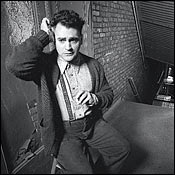
Let’s give the diabolist his due: As The Pillowman demonstrates, Martin McDonagh can manage creepiness as well as anyone, and black humor (however derivatively from Ionesco, Pinter, Mamet, Caryl Churchill, and even Of Mice and Men) with prime acumen. He would qualify for the Neil LaBute Award but for one thing: His stuff isn’t sexy. Comparisons to Kafka, sometimes invoked, are odious; there, horror has tragic dimensions and is not reveled in. Somewhere in all masters of the genre there are redemptive figures or notions of the good; in The Pillowman, there is only the bad and the worse.
Katurian, the protagonist, is an amoral writer of short stories, many of them revolving around the murder of, and sometimes also murder by, children. In an unnamed Eastern European country under a dictator, two policemen—the self-styled good cop Tupolski and the so-called bad cop Ariel (named for the spirit of light!)—are questioning and intermittently torturing Katurian and, it seems, in an adjoining cell, his retardate brother, Michal. Katurian is unconcerned with the consequences of his stories, which appear to have inspired copycat infanticides, and is himself capable of some, possibly justifiable murders. His brain-damaged brother, an enthusiastic fan of the stories, may be the real-life perpetrator. The policemen are studies in sadism: Tupolski subtle, Ariel mostly plain brutal.
But what makes the play truly offensive, aside from an unhealthy dose of the improbable largely involving the brothers’ parents, is the smirking authorial self-satisfaction the play gloatingly exudes. It doesn’t help that, as McDonagh admits, Katurian is a fanciful self-portrait of the author, whose plays have been criticized for their nastiness. What is a little adverse criticism against the numerous awards, international productions, and critical and audience accolades McDonagh has gleaned? The supreme and only unquestioned good in the play is the preservation of Katurian’s stories from censorship and police destruction; in other words, McDonagh’s literary survival, no matter who and how many must die horribly for it.
This said, one must acknowledge the efficiency of the production, notably the way certain scenes from the past are enacted in pantomime on an upper stage behind sliding panels. John Crowley, who directed in London, where the show won an Olivier Award, artfully repeats here. Scott Pask’s set and costume design, no doubt indebted to the English production, is appropriately effective, and there is powerful lighting by Brian MacDevitt.
The acting could not be better. As Tupolski, Jeff Goldblum gives what may be the performance of his career, squeezing every ounce of humor out of the horror, and vice versa. Billy Crudup is able to draw on an inexhaustible trove of histrionic devices to make the basically unlikable Katurian as sympathetic as humanly possible. Zeljko Ivanek finds all sorts of arresting nuances in the largely monochromatic Ariel, and Michael Stuhlbarg, as Michal, should finally win over even those who, unlike some of us, have consistently underappreciated his many-sided talent.
But what of dialogue that surpasses even Albee’s in the gratuitous use of the archetypal four-letter word, preferably in its seven-letter adjectival expansion, and of the proclivity to stretch black jokes into verbal Silly Putty? Thus Tupolski’s “I wrote a little story once, y’know. It sort of summed up my worldview in some ways. Well, no, it didn’t really sum up my worldview. I don’t have a worldview. I think the world’s a pile of shit. That isn’t really a worldview, is it? Or is it? Hmmm. [Pause.] Anyway, I wrote this little story once, and … hang on, all right, no, if it doesn’t sum up my worldview, it sums up my view of detective work and the relation of that detective work to the world at large. That’s it, yeah.” Actually, I think it does sum up, however long-windedly, Tupolski’s worldview. And also, most likely, McDonagh’s.
The Pillowman
Martin McDonagh.
Directed by
John Crowley.
Booth Theatre.